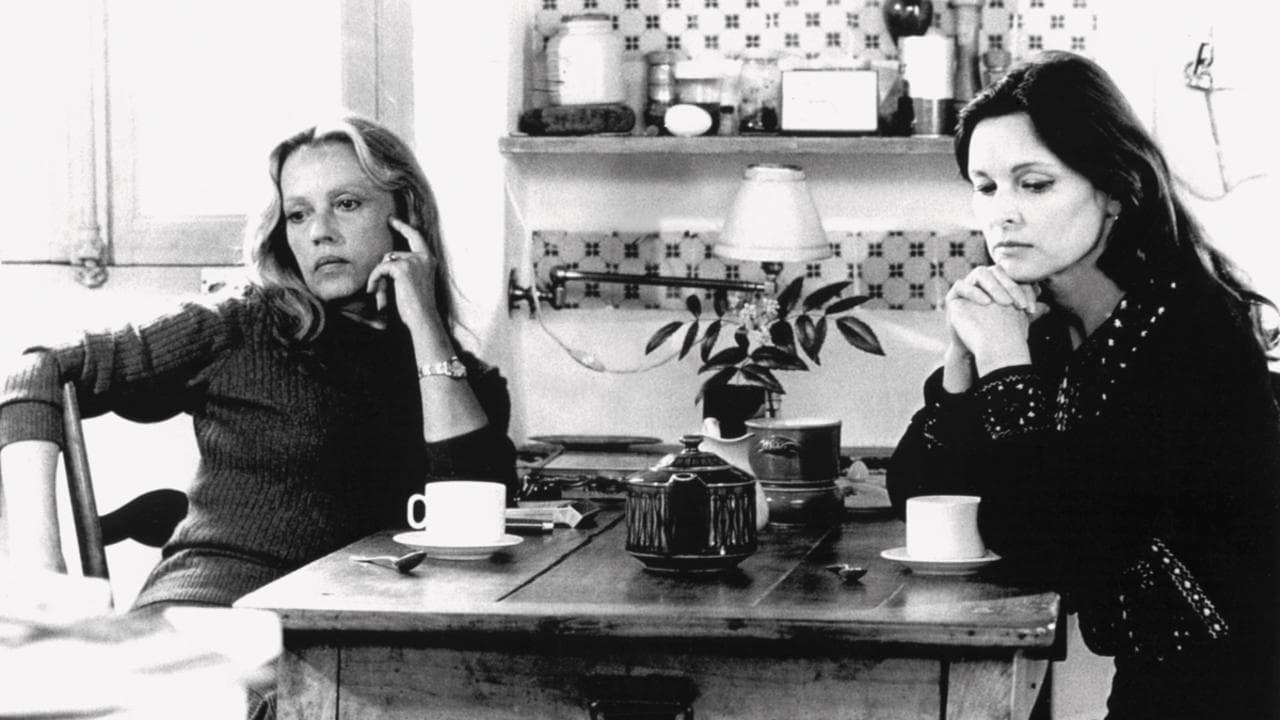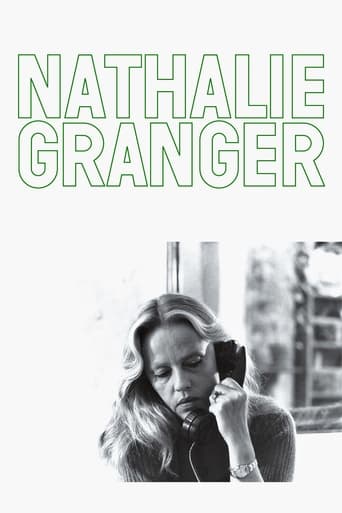Supelice
Dreadfully Boring
Solidrariol
Am I Missing Something?
Brendon Jones
It’s fine. It's literally the definition of a fine movie. You’ve seen it before, you know every beat and outcome before the characters even do. Only question is how much escapism you’re looking for.
Teddie Blake
The movie turns out to be a little better than the average. Starting from a romantic formula often seen in the cinema, it ends in the most predictable (and somewhat bland) way.
Natalie Granger
Being no expert in French minimalist films, I stumbled across this film as it bears my name. Being a minimalist myself, I was compelled to watch it even though the reviews are variable. Much could be written about what Dumas was trying to convey in this film, but watching it is like standing in front of Yves Kleins 1962 'Monochrome Painting'- make of it what you will. Two women (sisters?) go about their day in their middle-class French house of the early 1970's. While the movie narrates the seemingly mundane, there is an undercurrent of mystery and perhaps malice surrounding the child, Nathalie, whom the movie is named after. We barely see Nathalie, but the viewer is drawn into joining her disturbed mother, Isabelle, in waiting for her while staring vacantly or walking the garden in her black cape. The two women prepare Nathalie's clothes and suitcase for her impending trip away to boarding school. The silence is occasionally broken by updates on the radio about the police hunt for a pair of serial killer teenagers who are hiding in the nearby forest. While nothing of note appears to happen, the air is heavy with expectancy, drawing the viewer in. What's wrong with Nathalie? Why do they have to send her away? What terrible, violent behavior does this seemingly innocent child display that would cause her to be expelled from school. The Other Woman/Isabelle's sister? mentions Nathalie told her she would like to kill people and become an orphan. Gerard Depardieu plays, in what appears to be his first movie, the role of The Salesman, who punctuates the emptiness with his bumbling door-to-door sales visit to sell a washing machine. Personally, I found this scene masterful. The women shred his confidence through their impenetrability and the statement "You are no salesman". Their cruel coldness cuts so deeply that he returns later, having questioned his entire life and career choices. He really is a bad salesman. Some may have missed the black humor in the ending of this scene where they finally let him know they already owned the model of washing machine he was so ineptly trying to sell them. They were only playing with him, like the black cat that stalks their house may play with an injured mouse. Others have commented about how this scene was unnecessary and misplaced but I believe it is the clue to what is wrong with Nathalie. The women are cold, hard and unemotional, particularly Nathalie's mother, Isabelle. We see they are capable of emotional cruelty. Has Nathalie been damaged by her mother and aunt (?), and is acting out with violence in a desperate attempt to for love and attention? The scene where Nathalie catches cats to push in a pram is telling. The cats will not oblige and run off into the forest. Nathalie yearns for love, but what she tries to love runs from her. In anger she pushes the pram into a ditch. The abandoned pram appears in other sequences, perhaps as a symbol of rejection. I am grateful for having found this obscure movie. It leaves a mark on you, and it's openness to interpretation and symbolism leaves you thinking even after the credits roll.
ANCHINN
not enough lines, but full of cinematic words. i can say it's a dictionary of cinematic words. it's silent but eloquence. real an intelligence. if you can't understand those words, you can' understand what Duras wanted to say. you know that's a loss of your life. blond hair-black hair, light color clothes-dark color clothes.... what do you think of that? maybe it's just a whim of the director. water-mirror. you can look in the water what reflects. do you recognize him or her? what if, you don't know someone reflects in water instead of you? what you gonna do? deny or affirm? is it really someone you don't know? listen to the radio. it's interesting. Polanski once use this method in Knife in the water. i witness in this film, that Duras moved by the several works of great Antonioni.
wkkbooks
Elliptical . . you are invited to project into the gaps. I find an atmosphere of unbearable tension, depression, grief, apprehension,watching two women living with some persistent post-traumatic stigma, unexplained, in a waiting that never ends. Something to do with the mother's unique, uncommunicable anguish over a very bad, violent, abnormal daughter. We never learn what she did or see her misbehave, we imagine the worst and her most innocent behavior seems unnerving, suggestive of evil. A double anguish, also having to do with a pair of depraved teenage boy killers on the loose in the neighborhood. Did they kill someone in the family? Or are they perhaps family members? Do the two women know something about these boys that the police don't? A numbed mood with its own rapturous nuances, separates them from the street world in front of the house, and the equally claustrophobic garden world in back of the house, the absolutely still house. Great actresses are denied the opportunity to act, a kind of negative violence which causes amazement and discomfort. By bizarre contrast, suddenly a radiant 24 year-old Depardieu, as an awkward vacuum cleaner salesman, gives a hilarious, virtuosic shaggy dog monologue out of Pinter or Beckett. Virtually his first film, it precedes his official filmography; what a discovery. The film goes nowhere, a fragment, a shard of smoky Durassian flint. The more Duras one already knows, the more one can appreciate this seemingly obscure and tedious film.
sleepsev
Though I don't know anything about French social contexts during the 1960's and 1970's, though I haven't read any of Duras' works, though I can't figure out what is the message behind this movie, I still feel "Nathalie Granger" is one of the most beautiful films ever made. The beauty of "Nathalie Granger" doesn't come from its visual quality nor the objects it depicts, but from its serenity and the way things are represented. I have to quote the phrase "makes my heart cave in" from "American Beauty" to describe my feeling for this movie, because that's what I really feel, and the feeling I get from "Nathalie Granger" is in a way similar to the feeling I get from the dancing plastic bag scene in "American Beauty,"though "Nathalie Granger" is not didactic at all. As for me who don't understand any symbols hidden in "Nathalie Granger," the great sense of enjoyment I get from this movie comes from its sublimation of simple things and of domestic chores. Duras makes me look at simple things again in such amazement, such wonder, such astonishment of how beautiful they actually are.For me, the table cleaning scene is one of the greatest scenes in cinematic history. Though I might have seen people clearing tables a thousand times in my life, I still feel I have never seen anything like this scene before. Duras can capture the beauty and the charm of simple things into her film, and by representing them like something we have never seen before, she also captures the hearts of the audience. Another thing that impresses me a lot is the performance of Lucia Bose, especially in the scene with Gerard Depardieu. I like the expression on her face very much when she listens to the salesman. The radio broadcast about murderers at large is another thing that I like. There are also many other extraordinarily beautiful and calm scenes in this movie: the tearing up of paper, the piano playing, the characters' walking, the things that they do with leaves, and the shots of a baby carriage. I describe only my feelings here, not the meaning of this movie, because a few books have already deciphered it. Though I'm aware that the feeling I get might not be what Duras intended, I still feel very grateful for her for opening my eyes to see a wonderful kind of beauty, and for giving me a rare and precious sense of "nonconforming serenity."

